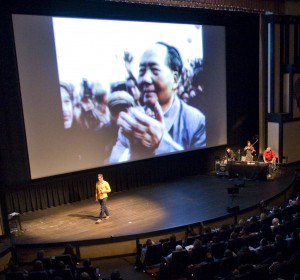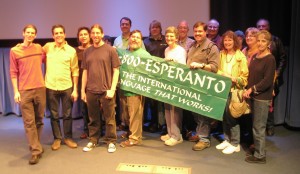Interview about Utopia in Four Movements Posted by Chuck Smith on Dec 6, 2010 in Uncategorized
Last week when I was in Amsterdam, I had a very unique opportunity to see a live documentary. Now, you may be wondering, how does that relate to Esperanto? Well, the documentary is called Utopia in Four Movements and one of those movements is Esperanto! Sam Green explains his idea[l]s behind the movie and future projects.
Could you explain what a live documentary is and what inspired the idea?
I call my new documentary Utopia in Four Movements a ‘live documentary’ because I narrate the film in person and cue the images from a laptop. Meanwhile a live band, The Quavers, perform a soundtrack as the film plays. This can be seen here on the left to help you visualize it.
I’m very taken with this form for a number of reasons. Primarily, it comes out of the subject matter. Filmmakers today have to either accept the fact that people will watch their movies on a laptop or iPod or do something that can’t be reduced to that format. I love the Internet – don’t get me wrong – but I think that seeing a movie in a theater with other people is a much more meaningful experience. Ultimately, the idea of a bunch of people watching this movie alone on laptops seemed kind of tragic to me. After all, utopia is almost always about a collective experience. So making a live documentary – one that you see in a theater with friends and other folks – a movie that is never the same twice – felt right.
Why did you choose these four topics to present utopia?
The movie looks at four different stories that all seem to be about utopia in one way or another. Some of the stories are more explicitly about utopia than others. First is the story of Esperanto. Then a section about an American revolutionary living in Cuba. The third part is about the world’s largest shopping mall in China. And the final section is about something called forensic anthropology which in many ways represents the violence and conflict of the 20th century. Hopefully, all of this together creates a poem or meditation on the world today and our feelings about hope and the future.
It can be argued that your film in some ways presents a bleak outlook on the future while at the same time inspiring hope in changing that. What was your intention showing these contrasts?
I hope that this film inspires hope, but in a complex manner. A complex kind of hope. These are difficult times in which we are living. I read the paper everyday and constantly struggle with feeling despondent. It’s hard to have your eyes open and still be hopeful. For me, it’s important to look clearly at the world, and also at the historical context that weighs on us, and then to figure out ways to have hope. This is complex hope – hope that can survive over the long haul. A good friend of mine Rebecca Solnit wrote a book a few years ago called Hope in the Dark: Untold Histories, Wild Possibilities. In it, she says, “To hope is to gamble – it’s to bet on the future, on your desires, on the possibility that an open heart and uncertainty is better than gloom and safety. To hope is dangerous, because to live is to risk.”
I know many Esperanto speakers are dying to see it and just don’t hear about the showing in time. Is there any “tour” page where we can see where you’re playing next?
We have a website for the film: www.utopiainfourmovements.com There’s a page called screenings where we list upcoming shows. We are always happy to have Esperantists in the audience. At the Seattle screening, we were pleased when a dozen Esperanto speakers showed up for the performance!
I heard that you’re now working on a half hour documentary that will be even more positive about Esperanto than Utopia. Can you confirm this rumor?
Yes, it’s true. The film is called The Universal Language. It will be finished in early 2011. It features interviews with Humphrey Tonkin, Renato Corsetti, Arika Okrent, and many Esperanto speakers I met at the Universal Congresses in Yokohama and Rotterdam.
Are you planning to eventually release a DVD?
Yes, definitely. I will post details on my website: www.samgreen.to
What other projects are you currently planning?
I am working on a long-term documentary about fog in San Francisco. And then I have some other projects that I’m working on but are too early in the process to talk publicly about.
Thank you very much for the interview and I wish you the most success with your films!

Build vocabulary, practice pronunciation, and more with Transparent Language Online. Available anytime, anywhere, on any device.
About the Author: Chuck Smith
I was born in the US, but Esperanto has led me all over the world. I started teaching myself Esperanto on a whim in 2001, not knowing how it would change my life. The timing couldn’t have been better; around that same time I discovered Wikipedia in it’s very early stages and launched the Esperanto version. When I decided to backpack through Europe, I found Esperanto speakers to host me. These connections led me to the Esperanto Youth Organization in Rotterdam, where I worked for a year, using Esperanto as my primary language. Though in recent years I’ve moved on to other endeavors like iOS development, I remain deeply engrained in the Esperanto community, and love keeping you informed of the latest news. The best thing that came from learning Esperanto has been the opportunity to connect with fellow speakers around the globe, so feel free to join in the conversation with a comment! I am now the founder and CTO of the social app Amikumu.






Comments:
trio:
English follows ->
eo (Esperanto)
Saluton Chuck,
Sam GREEN montros la novan DVD-on “The Universal Language” ĉe la Usona Landa Kongreso en San Francisko, 2011 junio 4a. Pli da detaloj poste.
en (English)
Hello Chuck,
Sam GREEN will be showing the new DVD “The Universal Language” at the US Esperanto Congress in San Francisco, June 4th, 2011. More details later.
giri Rao:
Many thanks, Chuck!
> The film is called The Universal Language.
> It will be finished in early 2011.
I wonder if a screening and discussion of these two films is do-able at the Copenhagen Congress?
Giri
Hyderabad, India
Neil Blonstein:
Well I finally got to browse a few articles on your blog. Perhaps the average Esperantist has heard of you because of Wikipedia, but beyond that you may be like me, active for Esperanto, but relatively unseen in the United States, due to your extended travels-I’m a little jealous– and residencies abroad. (I was in Israel 11 years during the prime of my Esperanto life, so known to most Israeli Esperanto speakers but unknown in the United States.) Anyway your intro added a few more details I didn’t already know. Good luck with the blog. www,EsperantoFriends.blogspot.com
Kontent Films:
Hi there!
Thanks for sharing this interview about Sam Green’s Utopia in Four Movements. If you’d like check out more of his work, Kontent Films and Sam Green are giving away 1 FREE copy of his Oscar-nominated documentary, THE WEATHER UNDERGROUND, signed by Director Sam Green along with an 8 x 10 mugshot of Bill Ayers. We are inviting all of you to participate.
More info @: http://kontentfilms.com/blog/2011/01/18/kontent-kollective-thanksgiveaway-5-the-weather-underground/